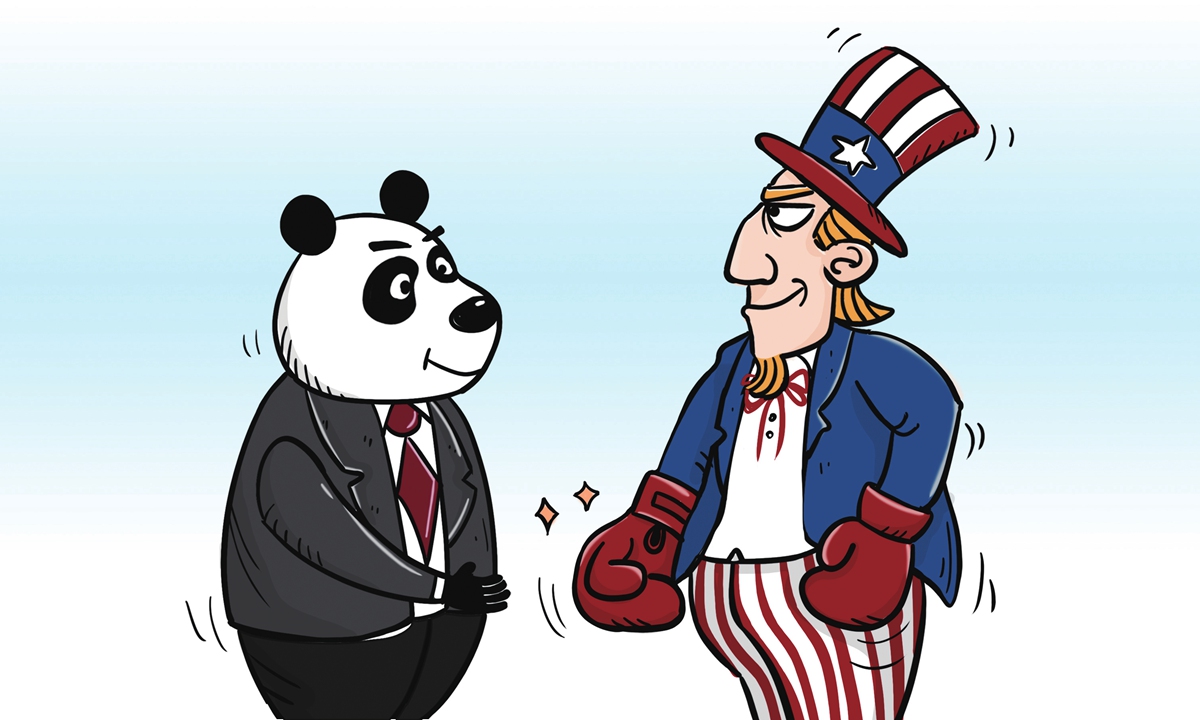Can the US treat China simultaneously a fierce rival and an inescapable partner?

Illustration: Chen Xia/GT
US political scientist Graham Allison said in an interview with the Global Times that he applauded the Biden administration's current search for a conception of the "rise of China" challenge that recognizes "China is simultaneously both a fierce rival and an inescapable partner." His views show the kind of China-US relationship that the Biden administration is aiming for: the US seeks both containment and cooperation in its China policy.The US direly needs China's cooperation to deal with major global challenges such as terrorism, global financial crises and climate change. But when it comes to issues such as values and development models, the US must compete with China and win. The US wishful calculation is this: When it comes to global issues that require China's cooperation, China is a partner. However, when it comes to issues related to international power, social systems, and development paths that do not meet the expectations of the US, China is a rival.
In this calculation, the US completely ignores China's feelings and national interests. It is totally hegemonic.
It's unrealistic and impossible for Washington to dominate China-US relations in such a way. Decades-long unremitting efforts and peaceful development have brought China to the center of the world stage. China has played a globally influential role and made great contributions in global governance. The US is unable to view China and point fingers at China in a condescending manner any more.
Allison argued that the US' new security partnership with the UK and Australia and deeper engagement with Quad is "an essential part" of an approach to create a coalition of forces that "can shape China's behavior" by attracting other nations with heft to sit on the US' side of the seesaw of power. Apparently, US elites are still viewing China-US relations in a condescending manner. They think the US should "shape China's behavior" rather than have dialogues with China on an equal footing.
The hegemonic status long held by the US means Washington will never allow any country or group of countries in any region of the world to challenge the US hegemony. But such a wish has to face harsh realities. The US cannot tolerate any challenger, but it has to turn to allies' help to safeguard its hegemony due to inadequate strength of its own. No matter who is in office (whether Republican or Democratic), a cold-war mentality prevails among the US elites to safeguard US hegemony. They will contain any potential challenger.
However, as a Chinese idiom goes, a just cause attracts much support, while an unjust one finds little. The US efforts in recent years have only seen a small number of countries be drawn to its side. The majority of countries in the world are unwilling to take sides with the US to confront China. They are more willing to develop cooperative relations with both countries. This is the mainstream public opinion of the world. The US' old tactics of suppressing, containing and encircling emerging powers through political, economic, military, cultural and public opinion and other means to safeguard its own hegemony cannot gain international support.
The return of Huawei CFO Meng Wanzhou on Saturday is a phased success of China's diplomacy. China's consistent struggles eventually made the US compromise on this issue. This could provide some lessons for the US to deal with China relations.
The release of Meng might leave some room for bilateral relations to ease, but this window of opportunity does not mean a complete thaw. Bilateral relations will continue to feature both competition and cooperation, with some mild improvements expected in the short term.
Through half a century's engagement and cooperation, China and the US have solved many global issues, including counter-terrorism, global financial crisis and climate change. If China-US relations are to restart, the premise is that the US adjusts its unrealistic hegemonic policies. It must engage in positive interactions with China, or the temporary thaw will only become the prelude of a larger-scale conflict.
The US should display its sincerity and consider mutual concerns instead of unilaterally raising demands and imposing sanctions on China. As two major powers responsible for the world, China and the US should avoid confrontation, especially man-made confrontation. The release of Meng makes people see some hope that China and the US can avoid conflicts. But China should not pin all its hopes that the US will not indulge in high-stakes mischief again. Nonetheless, even if the US insists on its containment policy, China's sustainable development cannot be stopped.
The author is an associate professor at the School of International Relations, Beijing International Studies University, and a visiting scholar at the University of Iowa. opinion@globaltimes.com.cn

